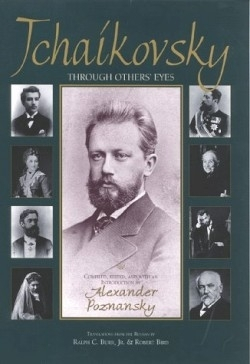Tchaikovsky through Others' Eyes
Tchaikovsky Through Others’ Eyes is just that: a compilation of memoirs, diary entries and interviews by Tchaikovsky’s contemporaries ranging from close friends and family members to colleagues and total strangers. The accounts are arranged chronologically around different periods of the composer’s life, such as his days as a student, his brief marriage and his status as a national treasure. The author, with factual information and an attempt to place all the accounts in context, introduces each chapter.
While some of these accounts have never been published in English before, Tchaikovsky Though Others’ Eyes is about more than just adding to the data collection of Tchaikovsky’s life. It is an attempt to clear the record about some of the rumors and myths that have surrounded the composer’s life. And as is always the case with the truth, it is sometimes less dramatic. The reminiscences in this book show a hardworking, disciplined man who flourished in quiet and routine. Poznansky writes, for example, that Tchaikovsky “never reached the ‘verge of insanity,’ as some of his later biographers would have us believe. In fact, Tchaikovsky strikes us as a highly self-conscious individual capable of laughing at his own foibles.” Poznansky would also have us believe that Tchaikovsky died merely of cholera and not from a forced suicide plot.
Some of the accounts in this book are conflicting. Some are even admitted to be inaccurate, which Poznansky warns the reader of in his chapter introductions. In many of the writings, the writers reveal more of their own personalities than that of Tchaikovsky. In one chapter, however, the reader is treated to hearing Tchaikovsky speak for himself in a reprint of an interview. His own words clear away a lot of the ingratiating rhetoric that many of the writers indulge in and the reader gets a sense of the determination of this man: “My system of work is purely craftsmanlike, that is, absolutely regular, always at the same hours of the day, without any leniency with respect to myself. I conceive musical ideas as soon as I take up my work, as I turn my attention from thoughts and concerns that are foreign to my labor.”
It is insights like this into Tchaikovsky’s character that make this intriguing collection appropriate for more than musicians. Tchaikovsky Through Others’ Eyes is a recommended study for anyone interested in the habits and personalities of great minds.
Disclosure: This article is not an endorsement, but a review. The publisher of this book provided free copies of the book to have their book reviewed by a professional reviewer. No fee was paid by the publisher for this review. Foreword Reviews only recommends books that we love. Foreword Magazine, Inc. is disclosing this in accordance with the Federal Trade Commission’s 16 CFR, Part 255.

